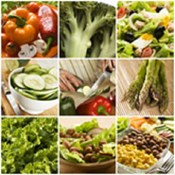There is some debate about whether cooked or raw vegetables are better to consume. The short answer is — don’t choose, have both!
Cooked
Lycopene content in tomatoes is actually increased when tomatoes are cooked. Lycopene is a phytochemical that is responsible for the red color of the tomato. Studies have linked high lycopene intake with lower risk of cancer and heart attacks. It is a powerful antioxidant.
Antioxidants help prevent or repair damage to body cells, which is important for decreasing risk of cancer. They are also thought to improve immune function.
Cooking carrots increases the beta carotene content. Beta carotene is an antioxidant that the body converts to vitamin A, also an antioxidant. It also helps promote normal vision, protect from infection and regulate the immune system.
There may also be additional antioxidant activity in cooked spinach, mushrooms, asparagus, cabbage and peppers. The cooking method found to be the best for preserving antioxidants was boiling or steaming. Frying is not recommended because the antioxidants get used up in the frying process.
Raw
In other instances, raw vegetables are better. For example, polyphenols, which are also antioxidants, are lost when carrots are cooked. In broccoli, heat damages the enzyme myrosinase. Myrosinase breaks down compounds in the broccoli to form another compound called sulforaphane, which may kill precancerous cells.
Vitamin C, also a powerful antioxidant that is found in many of the vegetables mentioned, can be destroyed by heat.
To get the best of both worlds, it is recommended to alternate consumption of raw and cooked vegetables to get a variety of nutrients.
Source: Tammy Roberts, MS, RD, LD, Nutrition and Health Education Specialist, Barton County, University of Missouri Extension







